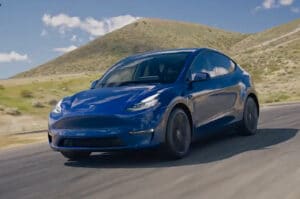
(This story has been updated to clarify the difference between electrified vehicles — hybrids and battery-electric vehicles — and EVs.)
Automakers and the media have been talking about electrified vehicles — BEVs and hybrids — for some time now. And it appears the public is finally getting on the same page.
Cox Automotive has reported that Q1 sales of these vehicles grew by 81% compared to the first quarter of 2020.
Cox spokesman Mark Schirmer said electrified vehicles — the combined total of EVs, hybrids and plug-in hybrids — accounted for 7.8% of the total sales last quarter, up from 4.8% in the same period one year ago.
“So while the overall numbers of EV sales are still relatively small, the growth of EV sales is tremendous,” Schirmer said. “(Electrified vehicle sales) going from 4.8% to 7.8% in a single year is impressive. The Chinese have a saying: ‘It’s not so who is big and who is small that’s important. It’s who’s getting and who’s getting smaller that matters.’”
Jump in EV sales impressive
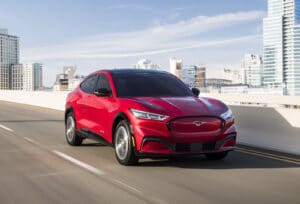
Electrified vehicle sales growth far outpaced industry growth, with EV volume growing by 44.8%, reaching nearly 100,000 units in the quarter — a new record, Schirmer said. Hybrids outpaced both the market and pure EVs, doubling sales to more than 200,000 in the quarter.
“We are looking at these numbers as important,” Schirmer said. “What’s important to remember is that both EVs and hybrids have battery packs. These need to be sourced and built. Then the battery pack life cycle needs to be managed.”
OEMs have spent years and billions of dollars developing the technology and building the infrastructure. GM, for example, has its Brownstown, Michigan facility for batteries. The company first announced that it was investing $65 million in the facility to build lithium-ion batteries back in 2014. The investment’s risen significantly since then through its partnership with South Korean battery maker, LG Chem.
The two companies teamed up to build at least two production facilities in the U.S. The first $2 billion facility nearing completion in Lordstown, Ohio. The second $2.3 billion site recently announced for Spring Hill, Tennessee to supply the newly introduced Cadillac Lyriq. Reportedly a third plant will be located in Texas.
Tesla getting some competition
The electric vehicle market is dominated by Tesla, which sold an estimated 69,300 vehicles in Q1 and remains the only automaker in the U.S. with an EV-only line-up. Tesla accounted for 71% of total EV sales, still the leading position but dropped from 83% in Q1 2020.
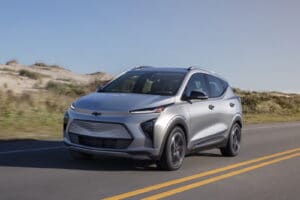
In fact, Tesla’s share of the U.S. battery market fell to 69% in February, a full 12-point year-over-year decline. In a note to investors, widely followed Morgan Stanley analyst Adam Jonas said the Mach-E was responsible for “nearly 100% of the share loss.” So the Q1 number represents a small rebound from the February result.
The Tesla Model Y is the best-selling EV in the U.S. Model Y growth, however, seems to be impacting Model 3 sales, which were down more than 50% year over year last quarter. The Chevy Bolt was No. 3 on the EV list, with nearly 10,000 sales in the quarter. Ford Mustang Mach-E came in at No. 4, outselling both the Tesla Model S and Model X.
Hybrid sales a rocket ride
While sales of EVs are beginning to take off, hybrid sales are soaring. In fact, sales of hybrids and plug-in hybrids jumped by 106% in Q1.
Toyota, a hybrid pioneer, delivered most of that growth, selling 124,449 electrified vehicles in Q1, up from 49,576 in Q1 2020. Rapid growth indeed: Nearly 25% of the new Toyotas leaving dealerships are now hybrids.
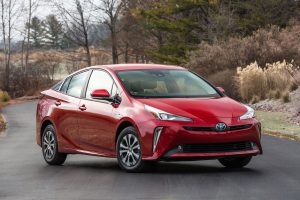
The popular Sienna minivan is hybrid only, and in Q1, Toyota sold more RAV4 Hybrids than Kia sold Sportages. Toyota’s strategy is to offer a variety of electrified vehicles and not focus solely on EVs. The hybrid side of the equation is performing well. Toyota will unveil two new EVs in the U.S. next year.
“Can you believe that the RAV4 Hybrid sells better than the Prius,” Schirmer said. “For years, the Prius was what people thought of when they heard hybrid. Now the Ram 1500 Hybrid is selling 7,000 vehicles a year. Ford is making an F-150 Hybrid. That’s amazing.”
These figures indicate that the public is becoming much more comfortable with battery-powered cars, Schirmer said. It would not be surprising to see these sales numbers increase even more next year.
Public getting help finding best EVs
As EVs rise in popularity, the media has taken notice. U.S. News & World Report announced the 2021 Best Hybrid and Electric Cars. Editors evaluated 73 vehicles and named winners across seven categories.
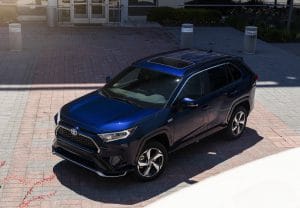
The Chevrolet Bolt EV won the Best Electric Vehicle award. Hyundai enjoyed the most wins of any brand, capturing the Best Plug-In Hybrid award with the Ioniq Plug-In Hybrid and the Best Hybrid Car award with the Ioniq Hybrid.
“The wave of electrified vehicles is starting to flood into the mainstream market,” said Jamie Page Deaton, executive editor of U.S. News Best Cars. “The Best Hybrid and Electric Car awards help consumers focus their shopping by highlighting the vehicles that not only reduce their emissions and fuel costs, but also fit into their lifestyle.”
Other winners included:
- Best Hybrid SUV — 2021 Ford Escape Hybrid
- Best Luxury Electric Vehicle — 2021 Tesla Model Y.
- Best Plug-In Hybrid — 2021 Audi A7 Plug-In Hybrid
- Best Luxury Hybrid — 2021 Lexus ES Hybrid
These awards were spread over OEMs based in Detroit, Europe and Asia. Tesla no longer has the EV market to itself. And the competition is only going to get tougher. These sales figures are a strong indication that the switch from the internal combustion engine to electric power is finally well underway.






